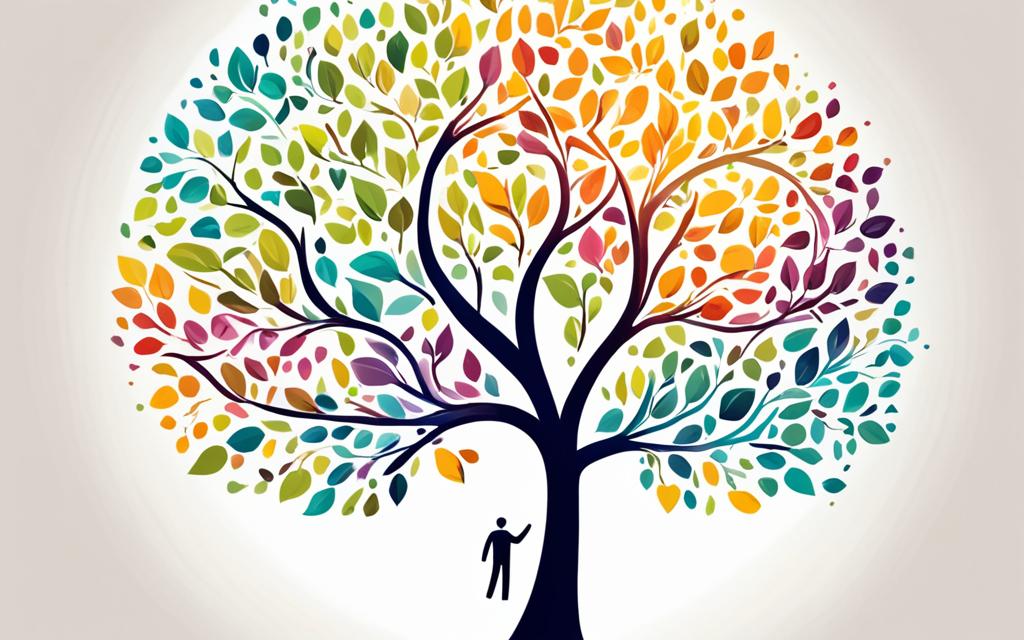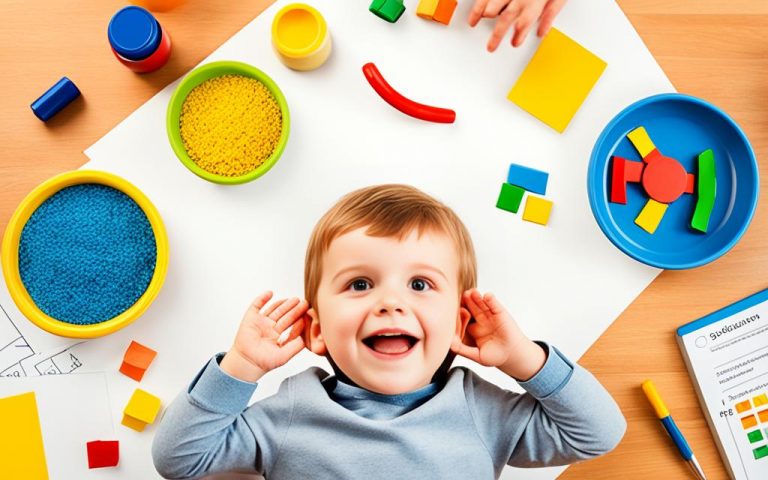Happiness and Self-Development
Do you want to live a more satisfying life? Working on your happiness and self-development is crucial. Personal growth is how you find real happiness and joy. In the busy world we live in, we often forget to focus on our well-being. But, by taking steps for self-improvement, you can start a journey. This path can bring you a stronger sense of purpose and happiness.
This piece looks into the link between happiness and self-development. It talks about how life coaching and positive psychology can help. Learn about mindfulness, emotional intelligence, and self-acceptance, important for long-term happiness. See how to become stronger, form better connections, and find your life’s purpose. All this while learning a mindset that lets you face challenges and grow.
Key Takeaways
- Understand the vital link between happiness and personal growth.
- Learn mindfulness techniques for cultivating presence and self-awareness.
- Develop emotional intelligence to manage emotions effectively.
- Embrace self-acceptance and self-compassion for a fulfilling life.
- Explore the principles of positive psychology and their impact on well-being.
- Discover the role of life coaching in achieving your goals.
- Implement strategies for stress management and work-life balance.
What is Happiness and Self-Development?
Happiness is all about feeling good inside and finding joy in life. Self-development is how we grow as people, always getting better at being ourselves. Together, they mean living a life that feels full, happy, and with a clear sense of why we’re here.
Understanding the Concept
When we talk about being happy, we mean feeling good, satisfied with life, and like we have a purpose. It’s a personal thing, based on who we are and what we find important, like our relationships and what we’ve achieved. Self-development, meanwhile, is about always getting better, learning new things, and growing as a person.
Self-development is a lifelong journey of self-discovery, self-actualization, and the realization of one’s full potential. – Dr. Carol Dweck, Psychologist and Author
The Importance of Personal Growth
Personal growth is key to self-development and being happy overall. It includes trying new things and facing challenges. By doing this, we not only make our lives better but also find more meaning and happiness.
Being mindful, knowing our emotions, and setting goals are great ways to grow. They help us understand ourselves better. This understanding can help us change for the better, face problems, and be happier.
- Mindfulness: Cultivating present-moment awareness
- Emotional Intelligence: Understanding and managing emotions effectively
- Goal Setting: Defining and pursuing meaningful objectives
- Self-Acceptance: Embracing oneself with compassion and authenticity
Choosing to grow and develop helps us reach our full potential. It lets us make real changes and find lasting happiness, not just temporary highs.
Mindfulness and Emotional Intelligence
Starting a journey to be happier and better involves mindfulness and emotional intelligence. They help you deal with life’s tough parts gracefully. They also make your bond with yourself and others stronger.
Cultivating Presence and Awareness
Mindfulness means staying focused on the moment without drifting off or passing judgment. It helps you get to know yourself better. This makes it easier to make thoughtful choices and face challenges head-on.
Try out simple mindfulness activities daily, like really enjoying your food or walking mindfully. This steady practice makes you more resilient. You’ll shake off bumps in life more easily.
Developing Emotional Mastery
Emotional intelligence is key for handling your feelings and those of others well. It includes understanding your emotions and being aware of others’. This helps you build better connections and make wise choices.
- Get to really know your feelings, strengths, and limits. This is self-awareness.
- Work on understanding and feeling for others. That’s empathy.
- Learn to handle your emotions in a good way. This is emotional regulation.
Techniques like writing, talking to people you trust, and thinking about yourself can improve emotional intelligence. You’ll feel more in tune with your feelings and those of people around you. This makes handling life’s twists and turns easier.
| Mindfulness | Emotional Intelligence |
|---|---|
| Being in the now | Knowing yourself |
| Looking without judging | Feeling for others |
| Easing stress | Emotional control |
Adding mindfulness and emotional intelligence to your life means a big step in becoming the person you want to be. You’ll grow, be happier, and feel a deep connection to yourself and the world. These tools can help you live with meaning and joy.
Self-Acceptance and Self-Compassion
Embracing self-acceptance and self-compassion is a big first step in growing and feeling good about yourself. It involves learning to love and value yourself for who you are, beyond what others might think or expect.
True self-acceptance means being okay with your good and bad parts, without being hard on yourself. It’s about enjoying what makes you unique and real. When you accept yourself, you stop feeling like you have to meet impossible standards. This freedom lets you live with real confidence and self-esteem.
Self-acceptance is the key to self-love, and self-love is the foundation for a fulfilled and meaningful life.
Self-compassion is just as important. It’s all about being kind and patient with yourself, especially when things get tough. Instead of being super critical, it’s like giving yourself a friendly hug, even when things don’t go as planned.
- Recognize that imperfection is part of being human, and it’s okay to learn from mistakes without being too hard on yourself.
- Fill your mind with positive thoughts. Cheer yourself on instead of bringing yourself down.
- Take care of yourself through mindfulness and activities that make you feel good. This helps you truly value who you are.
By being more self-accepting and self-compassionate, you set a strong base for personal growth and body positivity. You gain power to handle life’s up and downs with poise. Plus, you have the confidence to follow your ambitions, free from doubts and self-critique.
Positive Psychology and Happiness
Positive psychology is a growing field that focuses on how people can thrive. It looks into what makes us happy and well. Then, it offers ways to lead a more fulfilling life.
The Science of Well-Being
Positive psychology explores well-being and what makes life good. Researchers have found key elements that boost happiness and satisfaction. These factors include:
- Positive emotions: Feeling joyful, grateful, and satisfied often improves well-being.
- Engagement: Doing things you love and value, getting in the flow, leads to greater fulfillment.
- Positive relationships: Building strong and supportive connections enhances happiness and resilience.
- Meaning and purpose: Knowing your life’s significance and direction adds deep satisfaction.
- Accomplishments: Reaching personal and professional goals brings a sense of success and growth.
Cultivating Positive Emotions
Positive psychology focuses on boosting happy feelings. There are simple ways to bring more joy into our lives. This includes:
- Gratitude: Being thankful and noticing the good increases contentment and joy.
- Optimism: Staying positive and hopeful through challenges improves resilience.
- Savoring: Enjoying the moment, like a sunset or great meal, boosts happiness.
- Acts of kindness: Helping others lifts our spirits and spreads happiness.
By applying these positive psychology principles daily, we can live happier, more fulfilled lives. These practices are proven to help us thrive. So let’s start embracing them.
Happiness and Self-Development
The pursuit of happiness and self-growth go hand in hand. They support each other, leading to personal development and better well-being. When you start a journey to know yourself better, a growth mindset is key. This opens the door to your maximum potential and a truly satisfying life.
The Interconnectedness of Happiness and Personal Growth
Genuine happiness is strongly linked with personal growth. Regularly challenging yourself and trying new things brings purpose and joy. Stepping out of your comfort zone helps you understand your true self, values, and passions. This leads to a more meaningful life.
Embracing a Growth Mindset
A growth mindset is essential for self-improvement. It’s the belief that with effort, you can improve. It helps you welcome new challenges and see mistakes as learning opportunities. This mindset encourages continuous learning and enhancement, giving life more meaning.
Carol Dweck, a renowned psychologist and the pioneer of growth mindset theory, states, “Becoming is better than being.” This powerful quote encapsulates the essence of personal growth – an ongoing journey of self-discovery and self-improvement.
Having a growth mindset leads to serious personal growth. This, in turn, means more happiness and satisfaction in life. Believing that you can change your life is powerful. Letting this belief guide you can result in an ever-improving life, full of joy and purpose.
Life Coaching and Personal Development
Starting a journey of growth can change your life. But it can be hard to walk that path alone. A life coach is great for help. They push you towards positive change, unlock your potential, and find the success you’re aiming for.
The Role of a Life Coach
A life coach is like a friend who helps you see clearly and sets goals with you. They help you develop steps to beat problems. This involves seeing things from a new angle and changing how you think about things.

Setting Goals and Achieving Success
A big part of a life coach’s job is to set up big, but reachable, goals with you. They break your dreams down into doable steps. This makes it easier for you to keep going and celebrate when you hit points along the way.
Reaching success isn’t easy. Sometimes you have to get over big bumps or face tough times. Your life coach makes sure you have what you need to tackle these things. They push you to take control and be responsible for your choices. They help you get to know yourself better and find the strength to keep going even if it gets hard.
“A life coach is not someone who walks ahead of you to show you the way; they walk beside you, guiding and supporting you on your unique path.”
Working with a great life coach can really make a difference for your growth. They give you specific advice and strong support. They make you promise to yourself to do your best. Thanks to them, you can reach your true potential, grab onto important success, and live according to your biggest dreams and values.
Self-Care and Stress Management
In today’s quick world, finding a good work-life balance and taking care of ourselves is key. This helps us stay well and grow personally. Without this, we risk chronic stress and burnout. This could slow down our journey to being truly happy and growing as a person.
The Importance of Work-Life Balance
Finding a good work-life balance takes effort and commitment. If we focus too much on work, we might forget about what really matters in our personal lives. This can make us stressed, anxious, and less satisfied.
Strategies for Stress Reduction
To keep stress at bay and improve ourselves, it’s important to manage stress. This could include activities like meditation or deep breathing. Such practices help keep our minds calm and bring us peace.
A healthy lifestyle is also crucial. Regular exercise, eating well, and getting enough sleep can help reduce stress a lot. Exercise not only makes us physically healthier but also cheers us up by releasing mood-lifting chemicals.
Finding hobbies or activities that bring joy and a sense of achievement is crucial. It might be creating something, spending time in nature, or playing sports. These activities offer a break from daily stress and recharge our mental batteries.
“Self-care is never a selfish act – it is simply good stewardship of the only gift I have, the gift I was put on earth to cherish and spend wisely.” – Parker Palmer
Take care of yourself in ways that really work for you. With a life that’s in balance, becoming happier and achieving our personal best becomes easier. Prioritizing self-care is a great step towards a fulfilling life.
Building Resilience and Grit
Life is full of challenges. But, having resilience and grit can help you face them. Resilience means bouncing back from tough times. Grit is sticking with your goals through thick and thin. With these skills, you can handle life better, staying strong and positive.
Overcoming Challenges and Adversity
Adversity is hard, but it can help you grow. Resilience lets you adapt and find strength when things get tough. It’s about keeping a positive view and seeing challenges as chances to learn.
Resilience is the ability to adapt and bounce back when something difficult happens in your life. It means you can cope with and overcome adversity, trauma, or stress.
To get past hard times, look after yourself. Reach out to friends and family for support. There are also things you can do, like mindfulness or exercise, to manage stress.
Developing Mental Toughness
Mental toughness helps you stay focused on your goals no matter what. It’s about having grit. This mix of passion and perseverance keeps you moving forward, even through tough times.
- Embrace challenges: See obstacles as chances to grow, not as something impossible to pass.
- Practice self-discipline: Cultivate the power to avoid instant pleasure for your future success.
- Cultivate a positive mindset: Always keep an optimistic view, even when things don’t go your way.
- Learn from failures: Use mistakes to figure out better ways to move forward.
By working on resilience, grit, and mental toughness, you can face life’s challenges head-on. This leads to a stronger you and a more fulfilling life.
Relationships and Happiness
Building strong, healthy relationships is key to real happiness and growth. Our friends and family are not only there for us but they also make us feel good about ourselves.
The Impact of Healthy Relationships
Good relationships make us physically and mentally healthier. They raise our happiness and help us become better people. Feeling like we belong and are valued boosts our confidence.
In healthy connections, we can open up without being judged. This is why supportive relationships are like safe places for our emotions and thoughts.
Numerous studies have shown that individuals with strong social ties tend to live longer, have lower rates of depression and anxiety, and experience greater overall life satisfaction.
Cultivating Meaningful Connections
Creating and keeping deep relationships takes work. Being a good listener and talking honestly are very important. They help us build trust and understanding.
And spending quality time with those we care about is crucial. This can be through fun activities, meaningful talks, or just being there for each other.
Choosing friends with similar values who believe in our growth is crucial. They should be there to cheer us on but also pick us up when we fall. A strong support system encourages us during rough times and cheers for us during the good ones. This keeps us going on our path to becoming better.
- Practice active listening and empathy
- Prioritize quality time with loved ones
- Surround yourself with a supportive social network
- Communicate openly and honestly
Focusing on meaningful relationships can significantly improve our happiness and life. They are essential for our growth and journey to becoming our best selves. So, invest in the relations that truly bring value and joy to your life.
Finding Purpose and Meaning
In the journey towards happiness and growth, finding purpose and meaning is key. This quest leads us to true significance and a life in line with what we hold dear. It not only boosts our own development but also fills us with joy.
The Search for Significance
Looking for meaning is something we all do. It drives us to find what we love, our talents, and to set goals that matter to us. This process involves looking inside, reflecting, and being open about who we truly are.
True happiness comes from seeking meaning, not just being happy.
As we go through this path, staying aware and open is crucial. Finding what’s meaningful can happen in many ways. It could be through work, relationships, your personal projects, or how you help others. A mindset focused on growing and exploring our potential leads to experiences that fit our goals.
Living an Authentic Life
Living true to ourselves is the best way to find meaning. It means our actions and values match, showing our real self. This brings a strong sense of honesty and freedom from what others might expect of us.
Living by your values is crucial for a meaningful life. These values act as our guide, leading us to choices that deeply matter to us. Doing what we believe in, be it helping the planet, fighting for fairness, expressing ourselves creatively, or growing as individuals, makes our life meaningful and true.
Choosing a life centered around our values also means being brave and willing to differ, maybe against what others think. It’s about discovering who we are, and accepting that within us lies a unique journey. This self-acceptance lets us cherish our own special story.
Habits and Routines for Happiness
Cultivating happiness means taking small steps every day. These steps add up over time. The habits and routines we choose shape our well-being. Every action, no matter how small, can make a big difference in our daily happiness.
The Power of Daily Rituals
Creating daily rituals can lead to a more fulfilling life. They bring structure and balance. This allows us to focus on taking care of ourselves and growing as individuals.
Making time for things like mindfulness, learning, or hobbies is key. These activities help us stay grounded and move towards our dreams. They keep us centered in the now.
Happiness is a journey, not a destination. Cultivate daily rituals that align with your values and aspirations, and watch as they become the stepping stones to a life well-lived.
Creating a Sustainable Lifestyle
If you want to be truly happy, you must look at your whole life. This includes your health, emotions, relationships, and work. Identify what areas need to grow and then make positive changes.
Adding self-care to your daily life is crucial. This can be through exercise, healthy eating, or relaxation like meditation. It’s also important to connect with others. Spend time with loved ones, join groups, or volunteer.
Daily choices also impact the planet. Try to be green by reducing waste or supporting green companies. Living in a way that’s good for you and the Earth is fulfilling.
Change and progress take time. Be gentle with yourself. Celebrate even the small wins. This positive approach will keep you on the path to happiness and growth.
Conclusion
Choosing happiness and growth makes life better. We’ve looked at how growing personally is linked to our happiness. By paying attention, knowing our feelings, accepting ourselves, and staying open to learning, you find the way to be happy and feel satisfied.
Learning from positive psychology and talking with life coaches helps. They show you how to make real goals, be strong, and have good relationships. This is key for growth and joy. Also, taking care of yourself, handling stress, and finding meaning make life bright and peaceful.
Getting better goes on forever. It needs hard work and a true commitment. By using the advice from this post, you start towards a more meaningful and happy life. Enjoy the journey, see your improvements, and relish the benefits of true living.
FAQ
What is the connection between happiness and self-development?
Happiness and self-growth go hand in hand. By working on yourself, you find more meaning and feel satisfied. This boosts your happiness. Plus, being happy encourages you to grow further and seek new chances in life.
How can mindfulness and emotional intelligence contribute to self-development?
Mindfulness boosts your awareness now, lowers stress, and improves self-understanding. Emotional intelligence helps you manage emotions. This leads to better decisions and stronger connections, enhancing your well-being.
Why are self-acceptance and self-compassion important for personal growth?
Accepting yourself as you are, and being kind to yourself, is key. These promote self-esteem and a positive view. And they foster growth and joy.
What is positive psychology, and how is it related to happiness?
Positive psychology studies what makes us flourish and be happy. It looks at gratitude, optimism, and resilience. By focusing on these, we can boost our joy and satisfaction in life.
How can life coaching support personal development and goal achievement?
Life coaches guide and support you in reaching your goals. They help build a mindset for growth and assist in overcoming hurdles. They’re valuable for personal growth and success.
Why is self-care and stress management important for happiness and self-development?
Taking care of yourself and managing stress is vital for well-being. It includes balancing work and life, relaxation, and healthy living. This minimizes stress, boosts focus, and fosters happiness.
How can building resilience and grit contribute to personal growth?
Resilience and grit help you face challenges without giving up. These qualities let you learn from failures and keep striving. This promotes growth and development.
What is the role of healthy relationships in happiness and self-development?
Healthy relationships and connections are crucial for joy. They offer support and a sense of belonging. They encourage growth and development.







